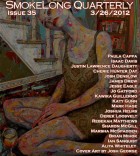What was it that led you to write “Conversion by Gasoline”?
That is one of my darlings. It is from a novel I’ve been working on for longer than I probably care to admit. I changed the timeframe, but one of the things I didn’t change was this idea of immolation, and the way that it could bring two people together like this.
There’s a story in issue 30 of SmokeLong about immolation that you might be interested reading. It’s a little flash, “Life Lesson” by Damien Dressick. You might enjoy it. The concept of your story is just so powerful and I love the way you ended on the image or concept of the girl supplanting the monks in her father’s memory. The potential of her going up in flames was very haunting.
Well it’s the only way that she can connect with him now. It’s this idea of childhood innocence and not knowing a parent anymore and still wanting and trying to connect with them even if it has to be in this very odd and horrible way.
Where do you—and this is a question I think every author hates to get, but it’s a question that every interviewer of an author has to ask—where do you draw from creatively? You drew this story from your book, of course, but what are your most common sources of material, of inspiration?
News stories to be honest with you. It almost always starts with an idea or a picture or a situation. That’s probably where it started and then I worked backwards from that. One that I’m working on now is definitely news story based. I get a lot of my stuff from really pedestrian things. You would never know because it takes so many twists and turns, but that’s what gets me started. I add and subtract and even if that’s where it starts from it’s never quite where it ends up. And I get the idea, but I won’t research it because I don’t want to stick to that reality. There are a lot of stories that kind of transcend the actual events and I find those stories interesting.
Talking about the specifics of “Conversion by Gasoline”: I noticed a sort of choppiness and fragmentation in the style. And when I read your award-winning piece “Facsimile in Boots” in Shenandoah, I saw the same thing. A close perspective, but a fragmented one. I was trying to think of an author that it reminded me of, and I couldn’t. Maybe freely associating, the author that kept jumping to mind was Cormac McCarthy—when he does those choppy flow-of-consciousness set-pieces, and with that grittiness, but he’s obviously, you know, way different. Is this your usual style, and why do you write these close perspectives in such a fragmented rhythm?
I think that’s such a compliment in some ways that it doesn’t sound too much like anyone, that’s very nice. And to be compared to McCarthy, it’s like I could stop writing now. I have been working for a while on this book, and in it I am very interested in language and this idea of fracture and about how language and form can take on the psychology of a character and kind of, almost inform the emotional part of it. How the language and form can convey emotional qualities of a character.
Care to give a teaser?
Okay, that little two-minute elevator interview. It is about the idea of cellular memory. The first part is about a troubled young girl, mentally unstable. And it’s about this man and his family who have been waiting for a heart transplant and religiously praying for it. And then he winds up ends up getting the young girl’s heart and that’s not necessarily a blessing.
Is fiction your primary genre?
I am pretty dedicated to fiction. Every once and a while I’ll have an essay. I just had a little flash essay accepted. But mostly fiction, because I don’t feel like my life is interesting enough for nonfiction.
What do you feel fiction can do for a reader?
The thing about fiction that I like so much, or the thing that really got me started, was the psychology of characters. More than anything else, I find myself when I’m starting a story—or in the middle of one—always thinking “Why would somebody do this?” That kind of problem-solving of character is really interesting to me. I usually start with questions: “Who would say something this horrible?” or “Who would say something this terrible?” Then it kind of springs from there.
Why do you think that readers in particular are so interested in the psychology of these characters? What is it about seeing a character develop in that way that really works for us?
You know, I used to get in trouble when I was little for staring at people, you know, like in restaurants, for staring at people. My mom would say, “You can’t do that, it’s rude.” I feel like it’s this outside-looking-in feeling. It’s just fascinating to me how people are, how just when you expect them to do one thing they do something totally different.
What is it that you like to read?
I don’t really have favorites. Now I’m reading two things. I’m reading Satanic Verses by Salman Rushdie right now, I just started it and am 30 or 40 pages in. And I’m also looking through an Aimee Bender collection, kind of about dueling texts.
What do you, what is it that you look for when you’re reading something what is it that really gets you going about a piece of fiction?
It’s usually not plot. It’s usually language or form. It doesn’t even have to be that highbrow. I’ve read Play It As It Lays lately—Joan Didion. Which is almost a novel in flash. I’d consider it a novel in flash. The chapters are very, very short. I’ve read Tim O’Brian’s July, July which was about a reunion and all the back-stories, it was interesting the way the narrative unfolded.
How long have you been writing?
I have been writing for a while. I’m four years out of MFA, so, I don’t know, six, seven, eight years?
Did you start writing in your MFA program?
I think I always knew that I wanted to write, but I didn’t really know the best way to go about it. I found myself doing a lot of other things, odd jobs. And then I was in advertising, the company went under, and I was laid off. I was unemployed for a year. And I finally decided to take some night classes because what I really wanted was somebody to say “You should not do this—you should stop entertaining this idea.” And so I would take night classes, night workshops, and I would go in and I thought I was going to die, it was so painfully horrible. Nobody said “stop,” nobody said “You shouldn’t do this.” I guess I’m still waiting for people to say “You should stop.”
Now, a lot of people discover new authors on SmokeLong, or at least I know I do. So let’s do a hypothetical situation: let’s say one of our readers sees “Conversion by Gasoline” and loves it and thinks, “I want read more by Marsha McSpadden.” Where do they go to get more?
Oh my goodness. See this is where I get all antsy, like I’m going to have to get a web site now. I have the Shenandoah piece, and I have a piece in Quiddity that has an audio reading on their website that you can click on. I’ve got a piece in Subterrain [57] as well.



 In September 2022 SmokeLong launched a workshop environment/community christened SmokeLong Fitness. This community workshop is happening right now on our dedicated workshop site. If you choose to join us, you will work in a small group of around 15-20 participants to give and receive feedback on flash narratives—one new writing task each week.
In September 2022 SmokeLong launched a workshop environment/community christened SmokeLong Fitness. This community workshop is happening right now on our dedicated workshop site. If you choose to join us, you will work in a small group of around 15-20 participants to give and receive feedback on flash narratives—one new writing task each week.